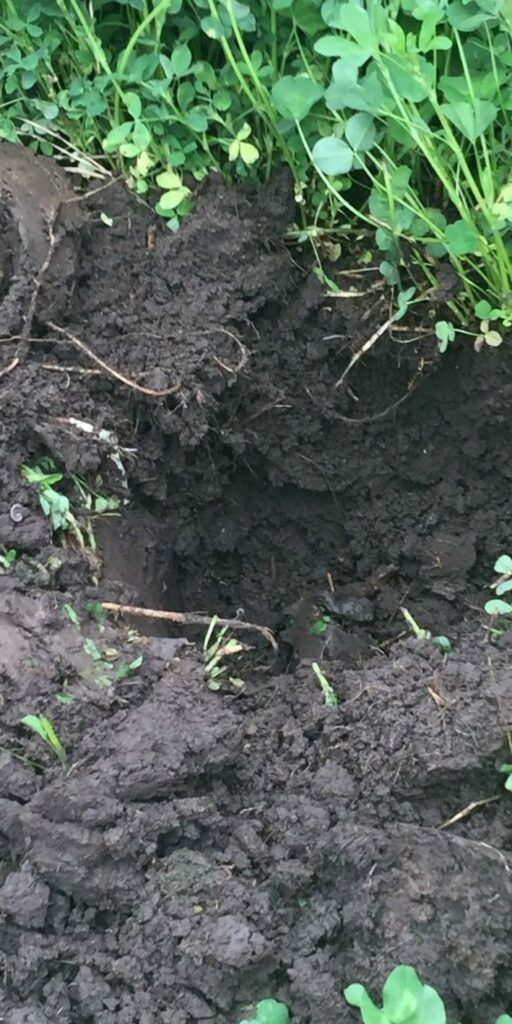Farming is an ever-changing and challenging business. By this time of year, crop outcomes are mostly out of our hands. Being organic, operations at Otter Creek Farms are always intense, from planting time all the way up until the window for weed control passes.
In southwestern Wisconsin, organic production got off to a poor start with all the rain and cold. However, the last ten days in May were great, and the crops are looking good. Recent changes at Otter Creek Farms include fewer livestock, more crop acres and increased crop diversity. We’ve typically used our herd “above the ground” to feed the herd “below the ground” through manure application, but with fewer livestock we needed to increase cover crop use and crop diversity to keep our soil biology thriving.
 Previously, everything we grew was harvested for our cattle, including corn stalks for bedding. We always put manure back on the land, but distribution was a challenge. Now, not only can the corn stalks stay out in the field as a carbon and nutrient source, but we’ve also been able to add more small grains into the rotation as we transition ground out of hay production.
Previously, everything we grew was harvested for our cattle, including corn stalks for bedding. We always put manure back on the land, but distribution was a challenge. Now, not only can the corn stalks stay out in the field as a carbon and nutrient source, but we’ve also been able to add more small grains into the rotation as we transition ground out of hay production.
We under-seeded many of our small grains with clover, alfalfa and grasses this spring. For fields without an under-seeded mix, we will plant a cover crop mix after harvest (much like how we manage our rye fields). After small-grain harvest, we generally clip the under-seeded mix, let it grow in the fall and apply nutrients as needed alongside manure. We also leave most of the straw in the field as an additional complex carbon source. The following spring, we work the mix into the ground after about a foot of growth. Results from this approach have not only improved our soils, but also allowed the farm to produce outstanding row crops.
Changes at Otter Creek

We planted over 100 acres of seed corn this year at Otter Creek Farms. Talk about a challenge! Female seed corn plants are typically weaker and slower growing. Male seed corn plants are equally challenging to manage and must also be planted at different times. At the last cultivation for this season, we seeded a clover cover crop mix into the seed corn fields. Our goal is to get good ground cover so when they de-tassel and open up the field, it doesn’t turn into a weed patch.
With seed corn, fertility management remains simple: we know what it takes to have enough nutrients available and delivered in time for plant uptake. Managing diverse rotations, cover crops and soil health requires a lot of common sense and the right tools for the job, especially in regard to tillage. I prefer shallow incorporation of residues and deep ripping as needed. I would love to be a zone-till or strip-till organic farm, but I haven’t figured out a plan to make that work to manage cover crops and weeds.
Updates from the Office
As we announced last summer, we did not host a field day at Otter Creek Farms this year. We have certainly enjoyed showing our farming system to thousands of customers, friends and curious minds over the past 25 years. We look forward to exploring new ways to share information on soil health, cover crops and balanced crop nutrition to an ever-expanding group of interested growers  across the Midwest.
across the Midwest.
Midwestern BioAg’s newly released TerraNu fertilizer line is one of the most exciting innovations I have seen in my many years in the fertilizer business. This is truly a game changer in agriculture. TerraNu fertilizers provide excellent coverage of nutrients in the field but also help close the nutrient gap in farming by giving large-scale row crop farmers easy access to manure. This brings the benefits of Midwestern BioAg’s carbon-based fertilizers through TerraNu’s manure matrix, a carbon-rich food source for soil life. This feature feeds soil life while providing optimum coverage of nutrients and enhancing plant uptake.
Early-season results following spring application of TerraNu are positive. Findings include larger leaf-area indices and improved nutrient uptake.
Our next step is to create an organic-allowed version of TerraNu for our organic customer base. Our research team is actively working on this project, and I look forward to bringing another great product into the organic marketplace.
Wishing you a successful summer and bountiful harvest,
Gary Zimmer, Founder, Midwestern BioAg

